【精彩课堂】 Unit 9 Section A2d&Grammar Focus 语法讲练 课件(新目标八上Unit 9 Can you come to my party?)
文档属性
| 名称 | 【精彩课堂】 Unit 9 Section A2d&Grammar Focus 语法讲练 课件(新目标八上Unit 9 Can you come to my party?) | 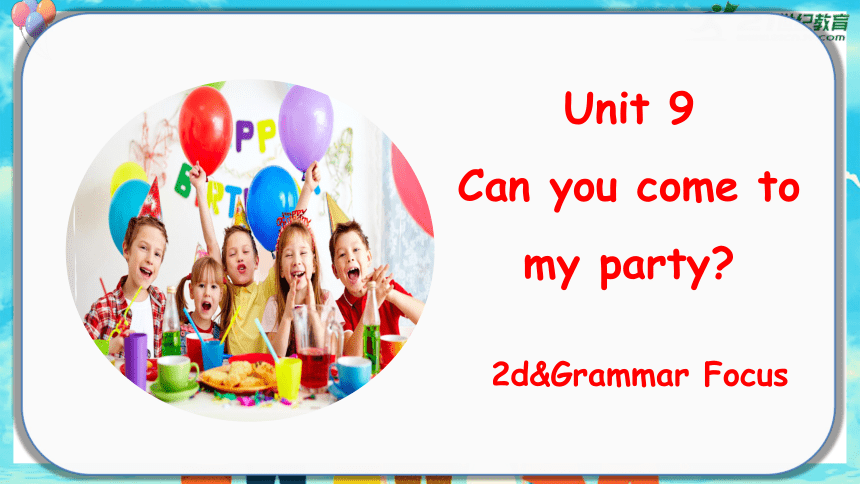 | |
| 格式 | pptx | ||
| 文件大小 | 11.4MB | ||
| 资源类型 | 试卷 | ||
| 版本资源 | 人教新目标(Go for it)版 | ||
| 科目 | 英语 | ||
| 更新时间 | 2023-12-06 14:40:54 | ||
图片预览


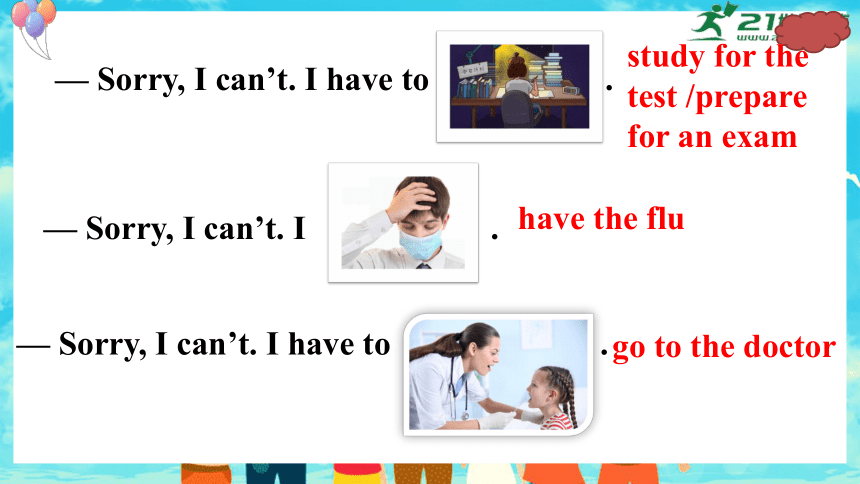
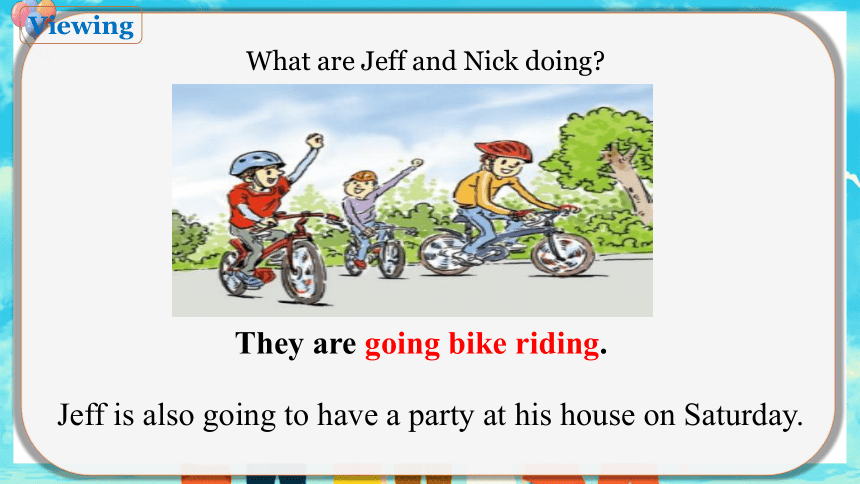
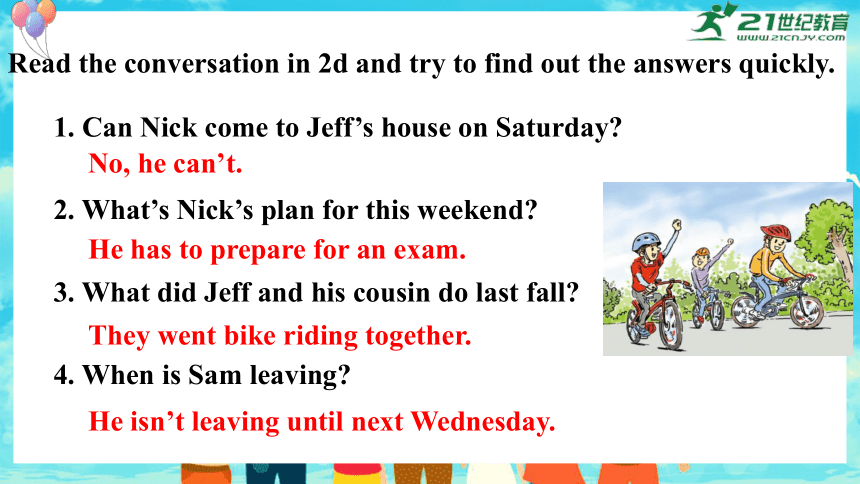
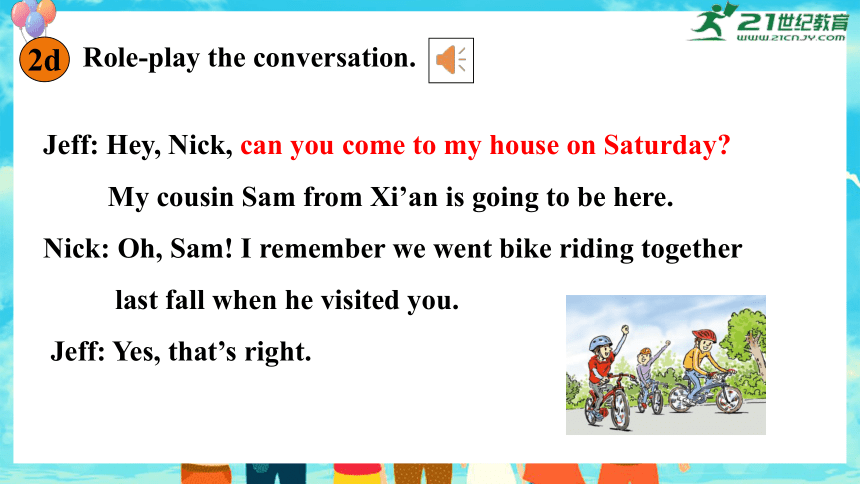
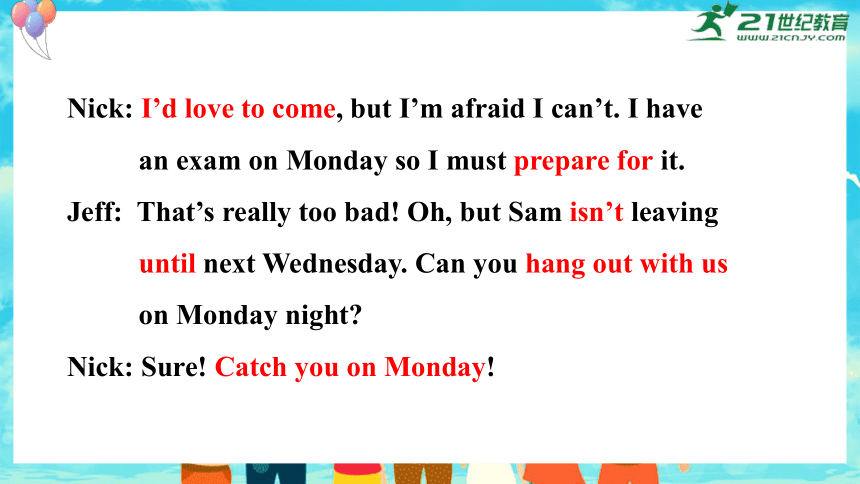
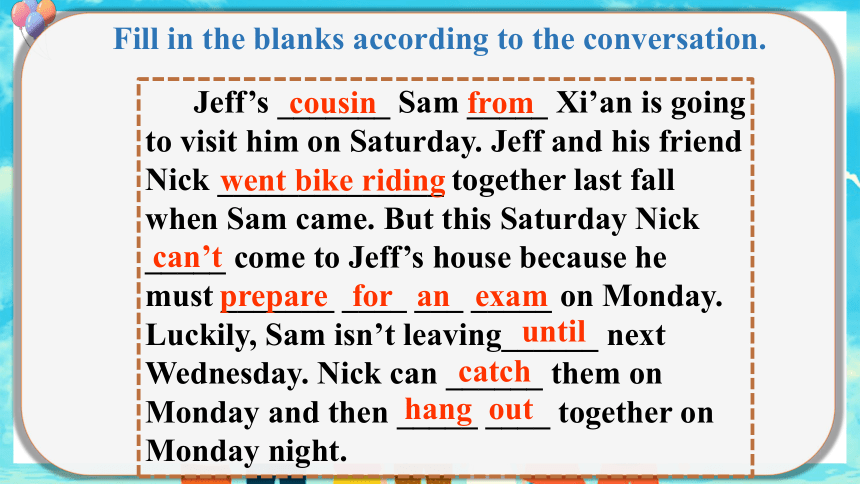
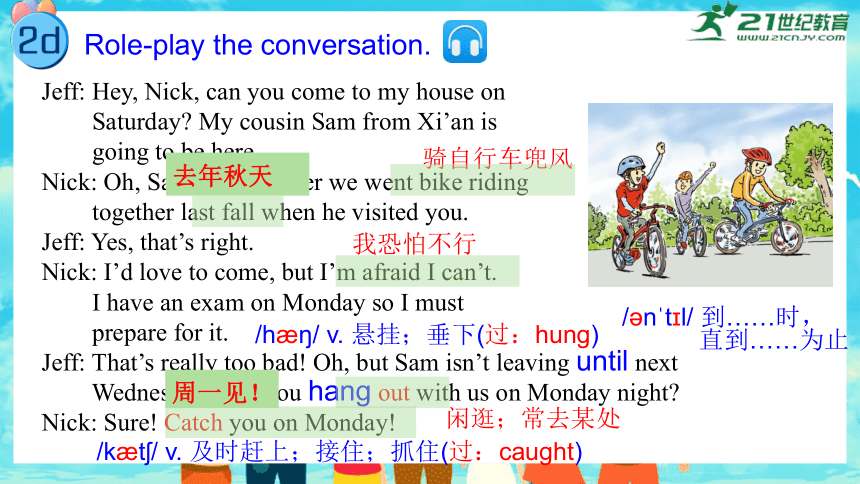
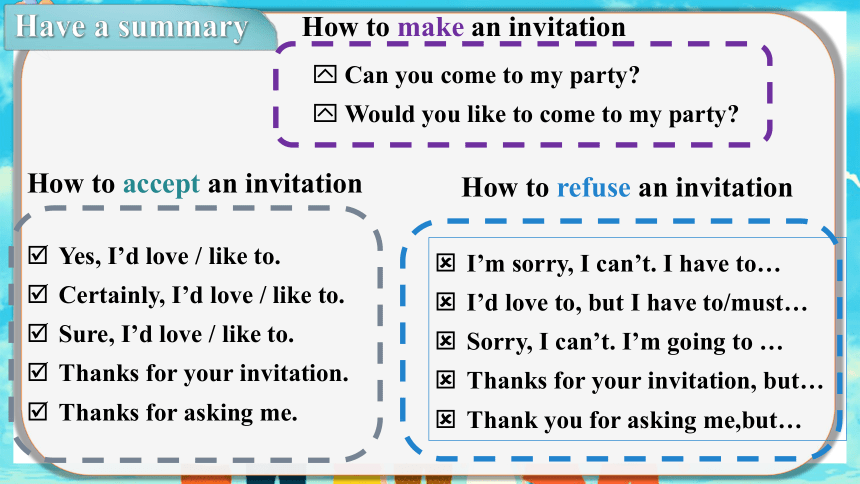

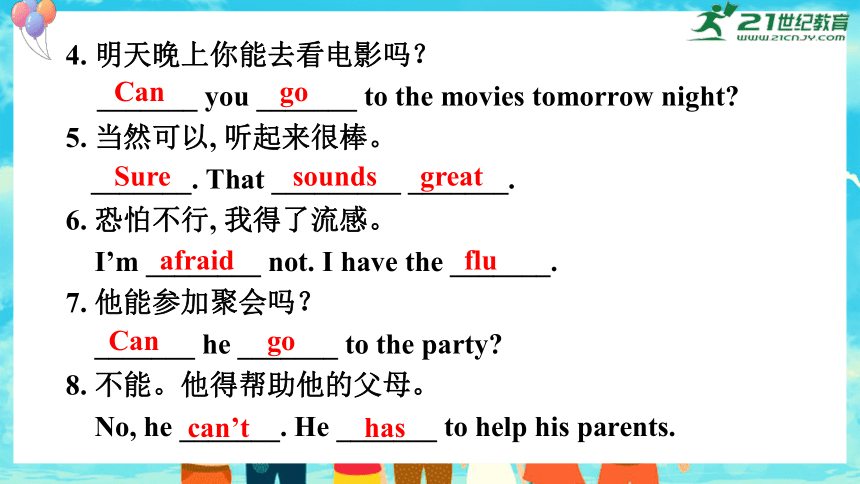
文档简介
(共52张PPT)
2d&Grammar Focus
Unit 9
Can you come to my party
New Year’s Day is coming.I will have a New Year’s Party at home. Can you come to my party
Yes, I’d love to.
Sorry, I have to...
— Sorry, I can’t. I have to .
— Sorry, I can’t. I .
study for the test /prepare for an exam
have the flu
— Sorry, I can’t. I have to .
go to the doctor
What are Jeff and Nick doing
They are going bike riding.
Viewing
Jeff is also going to have a party at his house on Saturday.
Read the conversation in 2d and try to find out the answers quickly.
1. Can Nick come to Jeff’s house on Saturday
2. What’s Nick’s plan for this weekend
3. What did Jeff and his cousin do last fall
4. When is Sam leaving
No, he can’t.
He has to prepare for an exam.
They went bike riding together.
He isn’t leaving until next Wednesday.
2d
Role-play the conversation.
Jeff: Hey, Nick, can you come to my house on Saturday
My cousin Sam from Xi’an is going to be here.
Nick: Oh, Sam! I remember we went bike riding together
last fall when he visited you.
Jeff: Yes, that’s right.
Nick: I’d love to come, but I’m afraid I can’t. I have
an exam on Monday so I must prepare for it.
Jeff: That’s really too bad! Oh, but Sam isn’t leaving
until next Wednesday. Can you hang out with us
on Monday night
Nick: Sure! Catch you on Monday!
Fill in the blanks according to the conversation.
Jeff’s _______ Sam _____ Xi’an is going to visit him on Saturday. Jeff and his friend Nick ______________ together last fall when Sam came. But this Saturday Nick _____ come to Jeff’s house because he
must _______ ____ ___ _____ on Monday.
Luckily, Sam isn’t leaving______ next Wednesday. Nick can ______ them on Monday and then _____ ____ together on Monday night.
cousin
from
went bike riding
can’t
prepare for an exam
until
catch
hang out
Role-play the conversation.
Jeff: Hey, Nick, can you come to my house on
Saturday My cousin Sam from Xi’an is
going to be here.
Nick: Oh, Sam! I remember we went bike riding
together last fall when he visited you.
Jeff: Yes, that’s right.
Nick: I’d love to come, but I’m afraid I can’t.
I have an exam on Monday so I must
prepare for it.
Jeff: That’s really too bad! Oh, but Sam isn’t leaving until next
Wednesday. Can you hang out with us on Monday night
Nick: Sure! Catch you on Monday!
周一见!
去年秋天
闲逛;常去某处
骑自行车兜风
/ n t l/ 到……时,
直到……为止
/h / v. 悬挂;垂下(过:hung)
/k t / v. 及时赶上;接住;抓住(过:caught)
我恐怕不行
How to make an invitation
Can you come to my party
Would you like to come to my party
Have a summary
How to accept an invitation
Yes, I’d love / like to.
Certainly, I’d love / like to.
Sure, I’d love / like to.
Thanks for your invitation.
Thanks for asking me.
How to refuse an invitation
I’m sorry, I can’t. I have to…
I’d love to, but I have to/must…
Sorry, I can’t. I’m going to …
Thanks for your invitation, but…
Thank you for asking me,but…
1. 星期六你能来我的聚会吗?
_______ you _______ to my party on Saturday
2. 当然, 我乐意去。
Sure, _______ _______ _______.
3. 对不起, 我必须为数学考试备考。
Sorry, I _______ _______ _______ a math test.
I’d love to
Can come
must study for
根据课本内容, 完成下列句子。
4. 明天晚上你能去看电影吗?
_______ you _______ to the movies tomorrow night
5. 当然可以, 听起来很棒。
_______. That _________ _______.
6. 恐怕不行, 我得了流感。
I’m ________ not. I have the _______.
7. 他能参加聚会吗?
_______ he _______ to the party
8. 不能。他得帮助他的父母。
No, he _______. He _______ to help his parents.
Sure sounds great
afraid flu
Can go
Can go
can’t has
9. 她能去看棒球比赛吗?
_______ she go to the baseball _______
10. 不,她没有空。她必须去看医生。
No, she’s _______ ________. She _______ _______ to the _______.
11. 他们能去看电影吗?
_______ they _______ to the _______
12. 不, 他们没有空。他们可能得去见朋友。
No, they’re not _______. They _______ _______ _______ meet their _______.
Can game
not available
must go
doctor
friends
Can go movies
free might have to
用can打听第三方是否能参加聚会,表示一种可能性。
用can发出邀请
接受邀请
拒绝邀请
说明理由
Observe
情态动词 can
用法
1. can 表示能力,表示“能,会”。
eg. She can play the piano.
2. can 表示许可,表示“可以”。
相当于may(比may更口语化);此外,could的语气更为委婉。
eg. May I come in
Could you help me
can表示邀请时常用一般疑问句句式,结构为:
Can+ 主语+ 动词原形+ 其他?
can表示邀请的用法
Can you come to my party on Saturday Sure, I’d love to.
Sorry, I must study for a math test.
Can you go to the movies tomorrow night Sure. That sounds great.
I’m afraid not. I have the flu.
Can he go to the party No, he can’t. He has to help his parents.
Can she go to the baseball game No. she’s not available. She must go to the doctor.
Can they go to the movies No, they’re not free. They might have to meet their friends.
How do we accept or refuse an invitation
(1) 常见表示接受邀请的回答:
① Sure, I’d love to.
② Yes, I’d love to.
③ Sure. That sounds great.
can表示邀请时,其回答分为两类。
一类是表示接受邀请,另一类是表示拒绝邀请。
(2) 常见表示拒绝邀请的回答:
① Sorry. I’m not available.
② I’m sorry. I’m not free this weekend. I have to ...
③ I’d love to, but I’m afraid I can’t. I have to...
拓展--其他情态动词
1. must/have to的用法
(1)must表示“必须”或“应当”,其否定式为mustn't。
以must开头的一般疑问句的肯定回答为:Yes, 主语+must;
其否定回答为:No, 主语+ needn't.
eg. --Must I finish my schoolwork today 我今天必须完成我的功课吗?
--No, you needn’t. 不,你不需要。
(2)have to也表示“必须,不得不”。
一般情况下,must表示说话人的主观看法,而have to 表示客观需要。
(3) 注意: must还可以表示推测 ,“一定” eg. It must be delicious. 它一定很好吃
▲
4. have to 的用法
(1) have to 的意思是“必须、不得不”, 往往强调由于客观原因而必须做某事。have (has) to 后面要用动词原形。当主语为第三人称单数时用 has to,当句子是过去时用 had to。如:
He has to work on Sunday. 他不得不在周日工作。
(2) have to 的否定句句型:主语 + don’t / didn’t / doesn’t / won’t + have to + 动词原形。如:
You don’t have to walk so fast. 你不必走那么快。
▲
4. have to 的用法
(3) have to 的疑问句句型:Do / Does / Did / Will + 主语 + have to + 动词原形。如:
— Did he have to ask the question —他非要问那个问题吗?
— Yes, he did. —是的。
— No, he didn’t (have to). —不。
▲
5. must 与 have to
must 表示主观“必须”;have to表示客观客观需要,即“不得不” 。如:
I don’t like this TV set. I must buy a new one.
This TV set doesn’t work. We have to buy a new one.
You must get up at five tomorrow.
We (will) have to get up early tomorrow.
【拓展】
表示同意邀请的回答还可用:
Yes, I’d love/like to.
Sure, it sounds great.
Certainly, I’d love/like to.
Sure, I’d love/like to.
Thanks for your invitation.
Thanks for asking me.
如果拒绝邀请,答语可用:
I’m sorry. I’m not free/available.
Thanks for your invitation. I might have to/must...
Sorry, I’m afraid not. I might have to/must...
Sorry, I can’t. I might have to/must...
I’d love to, but I have to…
No, I can’t. I’m going to ...
Thank you for asking me. But ....
I am afraid not, I...
【拓展】其他提出邀请的句型:
Could/ Will you…
Would you like to ...
How/ What about ...
Why not ...
Let’s ...
I hope you ...
can表示“做某事的可能性”,意为“可以”(可用来询问打听第三方能否参加某项活动)。对这种情况下can引起的问句仍由can或can’t作肯定或否定回答。
如课本中的句子Can he go to the party
肯定答语:Yes, he / she / they can.
否定答语:No, he / she / they can’t. 或No, he / she is / they are not available.等。
can表示可能性
—Can Alice go to the movies with us tonight
—Yes, she can. /
No, she’s not available. She has to look after her sister.
e.g. —Can he come here before nine tomorrow morning
—No, he can’t. He has to go to the music club first.
They might have to meet their friends.
might在此表示推测和可能性。它的可能性比may小。
情态动词might用法
e.g. She might not want to come with us.
她可能不想和我们一起走。
How long might the travel take
这次旅行需要多长时间?
Dad might know how to start that machine.
爸爸也许知道如何发动那台机器。
2. may/might的用法
(1)may也可表示邀请, 注意其否定回答为“No, 主语+ mustn't/ can’t”。
—May I go now ——我现在可以走了吗?
—No, you mustn't. ——不,你不能走。
(2)may表示说话人的猜测, 认为某一事情可能发生,其否定结构为may not, 其过去式为might not。
eg. The newspaper says that it might rain.
(3)might表可能,其语气比may更委婉,更加不确定。
His parents might come today. 他父母今天可能会来。
一、单项选择
1. Dirty air and water are harmful. They kill plants, and even people.
A. can B. can’t C. should D. shouldn’t
2. --Dad, I go out with my friends tomorrow?
-- I’m afraid you can’t.
A. would B. may C. need D. should
二、用have to和must填空
1. Her mother is badly ill, so she call the doctor at midnight.
2. My parents said that we study hard.
即时演练
A
B
had to
must
— ______ you give me a hand I cann’t do it by myself
— Sure.
A. Need B. Must C. Should D. Could
2. —Must I dress up like a princess
—No, you _____. You can choose whatever you like.
A. can’t B. mustn’t C. shouldn’t D. needn’t
3. —Jack, you finish you homework in 20 minutes
— Yes, I can.
A. can B. must C. should D. need
D
当堂训练
D
A
4. —Whose schoolbag is this
—It ______ be Lily’s. Her name is on it.
A. must B. should C. might D. may
5. I ______ her invitation because I must prepare for an exam.
A. rewarded B. accepted C. refused D. received
6. Jim invited us ______ come to his party.
A. come B. to come C. came D. coming
C
A
B
1. There is no light on-they _______ be at home.
A. mustn’t B. can’t C. needn’t
(2021黑龙江牡丹江鸡西中考)
2. —I wonder if this glass is Tom’s.
—It ______ be his. His was broken just now.
A. mustn’t B. may not C. can’t D. shouldn’t
(2021湖北黄石中考)
C
B
3. —Sam, ________ I join you in the community service
—Of course you can.
A. can B. must C. should D. need
4. We____ have a graduation ceremony next week, but I'm not
sure.
A. must B. need C. might
(2021黑龙江绥化中考)
C
A
watch TV, on the weekend, my cousin,
visit my grandparents, practice the violin
1. A: What are you going to do on Saturday
B: I’m not sure. I might ________________________.
Complete the answers with might and one of the phrases in the box.
visit my grandparents
拜访我的(外)祖父母
2. A: What are you planning to do after school
B: I don’t know. ________________.
3. A: When will you finish the science homework
B: _____________________________________________.
I might watch TV
I don’t know. I might finish it on the weekend
在周末
放学后
watch TV, on the weekend, my cousin,
visit my grandparents, practice the violin
4. A: Who are you going to the movies with
B: ______________________________________.
5. A: Are you free to come to my place on Saturday
B: ______________________________________________.
I’m not sure. I might go with my cousin
I’m not sure. I might have to practice the violin
练习小提琴
watch TV, on the weekend, my cousin,
visit my grandparents, practice the violin
Complete the sentences below. Use the words in brackets to help you.
1. Inviting: ______________________________ (can/play tennis)
Accepting: __________________________________________
2. Inviting: ____________________________________________ (would like to/go to the movies)
Refusing: __________________________________________
Reason: ____________________________________________
(might have to)
Can you play tennis on Saturday
Sure. That sounds great.
Would you like to go to the movies on Friday
Sorry, I can’t.
I might have to go out with my parents.
3. Inviting: __________________________________________
(can/hang out with us tonight)
Refusing: _________________________________________
Reason: ___________________________________________
(must)
4. Inviting: __________________________________________ (would like to / come to my birthday party)
Accepting: ________________________________________
Can you hang out with us tonight
Sorry. I am not free.
I must study for a test.
Would you like to come to my birthday party
Sure. I’d love to.
Write down everything you have to do next week. Choose a day and time to have a party.
Morning Afternoon Evening
MON.
TUE.
WED.
THUR.
FRI.
SAT.
SUN.
Invite your classmates to your party.
Example:
A: Can you come to my party
B: When is it
A: Next week, on Thursday night.
B: I’m sorry. I have to study for a math test.
v. 邀请
1. might & can
2. Making an invitation:
Can you …
Would you like to … /Do you want to …
3. Accept or refuse an invitation:
v. 接受
v. 拒绝
接受邀请:
Yes, I’d love/like to.
Sure, that sounds great.
Certainly, I’d love/like to.
Sure, I’d love/like to.
Thanks for your invitation.
Thanks for asking me.
拒绝邀请:
I’m sorry. I’m not free/available.
Thanks for your invitation. I might have to/must...
Sorry, I’m afraid not. I might have to/must...
Sorry, I can’t. I might have to/must...
I’d love to, but I have to…
No, I can’t. I’m going to ...
Thank you for asking me. But ....
I am afraid not, I...
根据语境及所给首字母提示,补全所缺单词。
1. Miss Miller, happy birthday to you! Please a this small gift.
2. —Kelly, can you come to my party this evening
—Sure. It’s very kind of you to i me.
accept
invite
3. Alice r my help. She said she could finish it by herself.
refused
选择题
1. Can you play tennis with on Saturday
A. us B. we C. our D. ours
2. Henry his homework this afternoon.
A. have to do B. have to doing
C. has to do D. has to doing
Exercise
3. Tony is playing tennis ________ the school team.
A. on B. in C. to D. with
4. Jim ________ play soccer with his friend this
weekend, because he is very busy.
A. can B. cans C. cann’t D. can’t
根据情景提示,用can写句子或将句子补充完整
1. 你想邀请Helen这周末和你一起去看电影,你可以这样问:
________________________________ with me this weekend, Helen
Helen接受你的邀请,她可以这样说:
____________________________________________________
____________________________________________________.
Helen拒绝你的邀请,理由是她得去看她的爷爷奶奶,她可以这样说:
I’m sorry, I can’t. ____________________________________.
Can you go to the movies / cinema
Sure, I’d love to / Sure. That sounds great / Yes, sure / Yes, I can
I must / have to visit my grandparents
2. 你想向Nick打听Cindy明天上午能否去爬山,你可以这样问:
Nick, _____________________________________________ tomorrow morning
Nick得知Cindy明天上午没有空,理由是她可能得去看医生,Nick可以这样说:
No, she’s not free. __________________________________
__________________________________________________.
can Cindy go to the mountains / go climbing
She might have to go to / see the / a doctor
翻译下面的句子。
Would you like to come to my birthday party It’s at four thirty on Friday.
Can you come to my place to have a dinner
on Sunday
2. 你想参加我的生日聚会吗?是星期五的四
点半。
1. 你周日能去我家吃晚饭吗?
— Can you come to my party
— I’m not sure. I might have to help my mom.
Sure, I’d love to.
— Can she go to the movies
— No, she can’t. She’s playing soccer.
5. —她能去看电影吗?
—不,她不能,她正在踢足球。
3. —你能参加我的晚会吗?
—我不确定。我可能得帮助我妈妈。
4.当然可以。我很愿意。
1. Thank you for (ask/ asking), but I can’t go to the movies with you.
2. Paul has to study (at/ for) the math test
tonight.
3. My sister has too (much/ many) homework
to do.
选择正确的选项填空。
asking
for
much
Write down the results of your invitation using the following structure. Give an oral report next class.
Structure:
I’m having a party on … I’m glad … is/are coming to my party, but … can’t come because he/she/they …
2d&Grammar Focus
Unit 9
Can you come to my party
New Year’s Day is coming.I will have a New Year’s Party at home. Can you come to my party
Yes, I’d love to.
Sorry, I have to...
— Sorry, I can’t. I have to .
— Sorry, I can’t. I .
study for the test /prepare for an exam
have the flu
— Sorry, I can’t. I have to .
go to the doctor
What are Jeff and Nick doing
They are going bike riding.
Viewing
Jeff is also going to have a party at his house on Saturday.
Read the conversation in 2d and try to find out the answers quickly.
1. Can Nick come to Jeff’s house on Saturday
2. What’s Nick’s plan for this weekend
3. What did Jeff and his cousin do last fall
4. When is Sam leaving
No, he can’t.
He has to prepare for an exam.
They went bike riding together.
He isn’t leaving until next Wednesday.
2d
Role-play the conversation.
Jeff: Hey, Nick, can you come to my house on Saturday
My cousin Sam from Xi’an is going to be here.
Nick: Oh, Sam! I remember we went bike riding together
last fall when he visited you.
Jeff: Yes, that’s right.
Nick: I’d love to come, but I’m afraid I can’t. I have
an exam on Monday so I must prepare for it.
Jeff: That’s really too bad! Oh, but Sam isn’t leaving
until next Wednesday. Can you hang out with us
on Monday night
Nick: Sure! Catch you on Monday!
Fill in the blanks according to the conversation.
Jeff’s _______ Sam _____ Xi’an is going to visit him on Saturday. Jeff and his friend Nick ______________ together last fall when Sam came. But this Saturday Nick _____ come to Jeff’s house because he
must _______ ____ ___ _____ on Monday.
Luckily, Sam isn’t leaving______ next Wednesday. Nick can ______ them on Monday and then _____ ____ together on Monday night.
cousin
from
went bike riding
can’t
prepare for an exam
until
catch
hang out
Role-play the conversation.
Jeff: Hey, Nick, can you come to my house on
Saturday My cousin Sam from Xi’an is
going to be here.
Nick: Oh, Sam! I remember we went bike riding
together last fall when he visited you.
Jeff: Yes, that’s right.
Nick: I’d love to come, but I’m afraid I can’t.
I have an exam on Monday so I must
prepare for it.
Jeff: That’s really too bad! Oh, but Sam isn’t leaving until next
Wednesday. Can you hang out with us on Monday night
Nick: Sure! Catch you on Monday!
周一见!
去年秋天
闲逛;常去某处
骑自行车兜风
/ n t l/ 到……时,
直到……为止
/h / v. 悬挂;垂下(过:hung)
/k t / v. 及时赶上;接住;抓住(过:caught)
我恐怕不行
How to make an invitation
Can you come to my party
Would you like to come to my party
Have a summary
How to accept an invitation
Yes, I’d love / like to.
Certainly, I’d love / like to.
Sure, I’d love / like to.
Thanks for your invitation.
Thanks for asking me.
How to refuse an invitation
I’m sorry, I can’t. I have to…
I’d love to, but I have to/must…
Sorry, I can’t. I’m going to …
Thanks for your invitation, but…
Thank you for asking me,but…
1. 星期六你能来我的聚会吗?
_______ you _______ to my party on Saturday
2. 当然, 我乐意去。
Sure, _______ _______ _______.
3. 对不起, 我必须为数学考试备考。
Sorry, I _______ _______ _______ a math test.
I’d love to
Can come
must study for
根据课本内容, 完成下列句子。
4. 明天晚上你能去看电影吗?
_______ you _______ to the movies tomorrow night
5. 当然可以, 听起来很棒。
_______. That _________ _______.
6. 恐怕不行, 我得了流感。
I’m ________ not. I have the _______.
7. 他能参加聚会吗?
_______ he _______ to the party
8. 不能。他得帮助他的父母。
No, he _______. He _______ to help his parents.
Sure sounds great
afraid flu
Can go
Can go
can’t has
9. 她能去看棒球比赛吗?
_______ she go to the baseball _______
10. 不,她没有空。她必须去看医生。
No, she’s _______ ________. She _______ _______ to the _______.
11. 他们能去看电影吗?
_______ they _______ to the _______
12. 不, 他们没有空。他们可能得去见朋友。
No, they’re not _______. They _______ _______ _______ meet their _______.
Can game
not available
must go
doctor
friends
Can go movies
free might have to
用can打听第三方是否能参加聚会,表示一种可能性。
用can发出邀请
接受邀请
拒绝邀请
说明理由
Observe
情态动词 can
用法
1. can 表示能力,表示“能,会”。
eg. She can play the piano.
2. can 表示许可,表示“可以”。
相当于may(比may更口语化);此外,could的语气更为委婉。
eg. May I come in
Could you help me
can表示邀请时常用一般疑问句句式,结构为:
Can+ 主语+ 动词原形+ 其他?
can表示邀请的用法
Can you come to my party on Saturday Sure, I’d love to.
Sorry, I must study for a math test.
Can you go to the movies tomorrow night Sure. That sounds great.
I’m afraid not. I have the flu.
Can he go to the party No, he can’t. He has to help his parents.
Can she go to the baseball game No. she’s not available. She must go to the doctor.
Can they go to the movies No, they’re not free. They might have to meet their friends.
How do we accept or refuse an invitation
(1) 常见表示接受邀请的回答:
① Sure, I’d love to.
② Yes, I’d love to.
③ Sure. That sounds great.
can表示邀请时,其回答分为两类。
一类是表示接受邀请,另一类是表示拒绝邀请。
(2) 常见表示拒绝邀请的回答:
① Sorry. I’m not available.
② I’m sorry. I’m not free this weekend. I have to ...
③ I’d love to, but I’m afraid I can’t. I have to...
拓展--其他情态动词
1. must/have to的用法
(1)must表示“必须”或“应当”,其否定式为mustn't。
以must开头的一般疑问句的肯定回答为:Yes, 主语+must;
其否定回答为:No, 主语+ needn't.
eg. --Must I finish my schoolwork today 我今天必须完成我的功课吗?
--No, you needn’t. 不,你不需要。
(2)have to也表示“必须,不得不”。
一般情况下,must表示说话人的主观看法,而have to 表示客观需要。
(3) 注意: must还可以表示推测 ,“一定” eg. It must be delicious. 它一定很好吃
▲
4. have to 的用法
(1) have to 的意思是“必须、不得不”, 往往强调由于客观原因而必须做某事。have (has) to 后面要用动词原形。当主语为第三人称单数时用 has to,当句子是过去时用 had to。如:
He has to work on Sunday. 他不得不在周日工作。
(2) have to 的否定句句型:主语 + don’t / didn’t / doesn’t / won’t + have to + 动词原形。如:
You don’t have to walk so fast. 你不必走那么快。
▲
4. have to 的用法
(3) have to 的疑问句句型:Do / Does / Did / Will + 主语 + have to + 动词原形。如:
— Did he have to ask the question —他非要问那个问题吗?
— Yes, he did. —是的。
— No, he didn’t (have to). —不。
▲
5. must 与 have to
must 表示主观“必须”;have to表示客观客观需要,即“不得不” 。如:
I don’t like this TV set. I must buy a new one.
This TV set doesn’t work. We have to buy a new one.
You must get up at five tomorrow.
We (will) have to get up early tomorrow.
【拓展】
表示同意邀请的回答还可用:
Yes, I’d love/like to.
Sure, it sounds great.
Certainly, I’d love/like to.
Sure, I’d love/like to.
Thanks for your invitation.
Thanks for asking me.
如果拒绝邀请,答语可用:
I’m sorry. I’m not free/available.
Thanks for your invitation. I might have to/must...
Sorry, I’m afraid not. I might have to/must...
Sorry, I can’t. I might have to/must...
I’d love to, but I have to…
No, I can’t. I’m going to ...
Thank you for asking me. But ....
I am afraid not, I...
【拓展】其他提出邀请的句型:
Could/ Will you…
Would you like to ...
How/ What about ...
Why not ...
Let’s ...
I hope you ...
can表示“做某事的可能性”,意为“可以”(可用来询问打听第三方能否参加某项活动)。对这种情况下can引起的问句仍由can或can’t作肯定或否定回答。
如课本中的句子Can he go to the party
肯定答语:Yes, he / she / they can.
否定答语:No, he / she / they can’t. 或No, he / she is / they are not available.等。
can表示可能性
—Can Alice go to the movies with us tonight
—Yes, she can. /
No, she’s not available. She has to look after her sister.
e.g. —Can he come here before nine tomorrow morning
—No, he can’t. He has to go to the music club first.
They might have to meet their friends.
might在此表示推测和可能性。它的可能性比may小。
情态动词might用法
e.g. She might not want to come with us.
她可能不想和我们一起走。
How long might the travel take
这次旅行需要多长时间?
Dad might know how to start that machine.
爸爸也许知道如何发动那台机器。
2. may/might的用法
(1)may也可表示邀请, 注意其否定回答为“No, 主语+ mustn't/ can’t”。
—May I go now ——我现在可以走了吗?
—No, you mustn't. ——不,你不能走。
(2)may表示说话人的猜测, 认为某一事情可能发生,其否定结构为may not, 其过去式为might not。
eg. The newspaper says that it might rain.
(3)might表可能,其语气比may更委婉,更加不确定。
His parents might come today. 他父母今天可能会来。
一、单项选择
1. Dirty air and water are harmful. They kill plants, and even people.
A. can B. can’t C. should D. shouldn’t
2. --Dad, I go out with my friends tomorrow?
-- I’m afraid you can’t.
A. would B. may C. need D. should
二、用have to和must填空
1. Her mother is badly ill, so she call the doctor at midnight.
2. My parents said that we study hard.
即时演练
A
B
had to
must
— ______ you give me a hand I cann’t do it by myself
— Sure.
A. Need B. Must C. Should D. Could
2. —Must I dress up like a princess
—No, you _____. You can choose whatever you like.
A. can’t B. mustn’t C. shouldn’t D. needn’t
3. —Jack, you finish you homework in 20 minutes
— Yes, I can.
A. can B. must C. should D. need
D
当堂训练
D
A
4. —Whose schoolbag is this
—It ______ be Lily’s. Her name is on it.
A. must B. should C. might D. may
5. I ______ her invitation because I must prepare for an exam.
A. rewarded B. accepted C. refused D. received
6. Jim invited us ______ come to his party.
A. come B. to come C. came D. coming
C
A
B
1. There is no light on-they _______ be at home.
A. mustn’t B. can’t C. needn’t
(2021黑龙江牡丹江鸡西中考)
2. —I wonder if this glass is Tom’s.
—It ______ be his. His was broken just now.
A. mustn’t B. may not C. can’t D. shouldn’t
(2021湖北黄石中考)
C
B
3. —Sam, ________ I join you in the community service
—Of course you can.
A. can B. must C. should D. need
4. We____ have a graduation ceremony next week, but I'm not
sure.
A. must B. need C. might
(2021黑龙江绥化中考)
C
A
watch TV, on the weekend, my cousin,
visit my grandparents, practice the violin
1. A: What are you going to do on Saturday
B: I’m not sure. I might ________________________.
Complete the answers with might and one of the phrases in the box.
visit my grandparents
拜访我的(外)祖父母
2. A: What are you planning to do after school
B: I don’t know. ________________.
3. A: When will you finish the science homework
B: _____________________________________________.
I might watch TV
I don’t know. I might finish it on the weekend
在周末
放学后
watch TV, on the weekend, my cousin,
visit my grandparents, practice the violin
4. A: Who are you going to the movies with
B: ______________________________________.
5. A: Are you free to come to my place on Saturday
B: ______________________________________________.
I’m not sure. I might go with my cousin
I’m not sure. I might have to practice the violin
练习小提琴
watch TV, on the weekend, my cousin,
visit my grandparents, practice the violin
Complete the sentences below. Use the words in brackets to help you.
1. Inviting: ______________________________ (can/play tennis)
Accepting: __________________________________________
2. Inviting: ____________________________________________ (would like to/go to the movies)
Refusing: __________________________________________
Reason: ____________________________________________
(might have to)
Can you play tennis on Saturday
Sure. That sounds great.
Would you like to go to the movies on Friday
Sorry, I can’t.
I might have to go out with my parents.
3. Inviting: __________________________________________
(can/hang out with us tonight)
Refusing: _________________________________________
Reason: ___________________________________________
(must)
4. Inviting: __________________________________________ (would like to / come to my birthday party)
Accepting: ________________________________________
Can you hang out with us tonight
Sorry. I am not free.
I must study for a test.
Would you like to come to my birthday party
Sure. I’d love to.
Write down everything you have to do next week. Choose a day and time to have a party.
Morning Afternoon Evening
MON.
TUE.
WED.
THUR.
FRI.
SAT.
SUN.
Invite your classmates to your party.
Example:
A: Can you come to my party
B: When is it
A: Next week, on Thursday night.
B: I’m sorry. I have to study for a math test.
v. 邀请
1. might & can
2. Making an invitation:
Can you …
Would you like to … /Do you want to …
3. Accept or refuse an invitation:
v. 接受
v. 拒绝
接受邀请:
Yes, I’d love/like to.
Sure, that sounds great.
Certainly, I’d love/like to.
Sure, I’d love/like to.
Thanks for your invitation.
Thanks for asking me.
拒绝邀请:
I’m sorry. I’m not free/available.
Thanks for your invitation. I might have to/must...
Sorry, I’m afraid not. I might have to/must...
Sorry, I can’t. I might have to/must...
I’d love to, but I have to…
No, I can’t. I’m going to ...
Thank you for asking me. But ....
I am afraid not, I...
根据语境及所给首字母提示,补全所缺单词。
1. Miss Miller, happy birthday to you! Please a this small gift.
2. —Kelly, can you come to my party this evening
—Sure. It’s very kind of you to i me.
accept
invite
3. Alice r my help. She said she could finish it by herself.
refused
选择题
1. Can you play tennis with on Saturday
A. us B. we C. our D. ours
2. Henry his homework this afternoon.
A. have to do B. have to doing
C. has to do D. has to doing
Exercise
3. Tony is playing tennis ________ the school team.
A. on B. in C. to D. with
4. Jim ________ play soccer with his friend this
weekend, because he is very busy.
A. can B. cans C. cann’t D. can’t
根据情景提示,用can写句子或将句子补充完整
1. 你想邀请Helen这周末和你一起去看电影,你可以这样问:
________________________________ with me this weekend, Helen
Helen接受你的邀请,她可以这样说:
____________________________________________________
____________________________________________________.
Helen拒绝你的邀请,理由是她得去看她的爷爷奶奶,她可以这样说:
I’m sorry, I can’t. ____________________________________.
Can you go to the movies / cinema
Sure, I’d love to / Sure. That sounds great / Yes, sure / Yes, I can
I must / have to visit my grandparents
2. 你想向Nick打听Cindy明天上午能否去爬山,你可以这样问:
Nick, _____________________________________________ tomorrow morning
Nick得知Cindy明天上午没有空,理由是她可能得去看医生,Nick可以这样说:
No, she’s not free. __________________________________
__________________________________________________.
can Cindy go to the mountains / go climbing
She might have to go to / see the / a doctor
翻译下面的句子。
Would you like to come to my birthday party It’s at four thirty on Friday.
Can you come to my place to have a dinner
on Sunday
2. 你想参加我的生日聚会吗?是星期五的四
点半。
1. 你周日能去我家吃晚饭吗?
— Can you come to my party
— I’m not sure. I might have to help my mom.
Sure, I’d love to.
— Can she go to the movies
— No, she can’t. She’s playing soccer.
5. —她能去看电影吗?
—不,她不能,她正在踢足球。
3. —你能参加我的晚会吗?
—我不确定。我可能得帮助我妈妈。
4.当然可以。我很愿意。
1. Thank you for (ask/ asking), but I can’t go to the movies with you.
2. Paul has to study (at/ for) the math test
tonight.
3. My sister has too (much/ many) homework
to do.
选择正确的选项填空。
asking
for
much
Write down the results of your invitation using the following structure. Give an oral report next class.
Structure:
I’m having a party on … I’m glad … is/are coming to my party, but … can’t come because he/she/they …
同课章节目录
- Unit 1 Where did you go on vacation?
- Section A
- Section B
- Unit 2 How often do you exercise?
- Section A
- Section B
- Unit 3 I'm more outgoing than my sister.
- Section A
- Section B
- Unit 4 What's the best movie theater?
- Section A
- Section B
- Unit 5 Do you want to watch a game show?
- Section A
- Section B
- Unit 6 I'm going to study computer science.
- Section A
- Section B
- Unit 7 Will people have robots?
- Section A
- Section B
- Unit 8 How do you make a banana milk shake?
- Section A
- Section B
- Unit 9 Can you come to my party?
- Section A
- Section B
- Unit 10 If you go to the party, you'll have a grea
- Section A
- Section B
